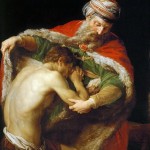Mormons have few set prayers, but those for blessing the bread and wine (for historical reasons we use water today) are set. The prayer said over the wine/water is a slightly condensed version of that said over the bread, which is:
O God, the Eternal Father, we ask thee in the name of thy Son, Jesus Christ, to bless and sanctify this bread to the souls of all those who partake of it; that they may eat in remembrance of the body of thy Son, and witness unto thee, O God, the Eternal Father, that they are willing to take upon them the name of thy Son, and always remember him, and keep his commandments which he hath given them, that they may always have his Spirit to be with them. Amen.
Covenant is inadequate as a translation of the Hebrew Bible’s term bĕrit. The English word is often used as a synonym for contract, but unlike the English word contract, bĕrit suggests an agreement between two unequal parties, one more powerful than the other, that creates obligation for both. By making covenant with the Father in the name of the Son, we recognize the Father’s authority over us, his glory and our nothingness before him. As we take the obligation of the covenant on ourselves, we pray that he will return our recognition by giving us the Spirit.
When we hear the prayer and eat the sacramental elements in earnest we make covenant with the Father that, in remembrance of the body of Jesus Christ, we will take the name of his Son, always remember him, and keep his commandments. The blessing of this covenant is that we may have his Spirit to be with us always. Then we repeat that covenantal act by drinking water in remembrance of the blood he shed. And each week we repeat each of these acts that make up one covenant. Twice each Sunday we are reminded of Christ’s death. Twice we make covenant to take his name and keep his commandments. Twice the ordinance promises that if we keep covenant we will receive his Spirit.
Mormons refer to this covenantal ritual as “the Sacrament.” The Sacrament is not a two-way promise, as we sometimes say. It is a prayer, a request made with priesthood authority, that the Father will recognize the obligations we have taken on ourselves and give us the Spirit. The language of the prayers is clear: we are obligating ourselves, assuming that doing so will bring the promised blessing. But that assumption is part of our prayer: “We ask thee to bless and sanctify this bread . . . that [those who eat it] may always have his Spirit to be with them.” When we eat and drink those things that represent the body and blood of Christ, we do so trusting that the Father will bless us.
The slaughtered animal of the Hebrew Bible’s covenant is replaced in the Sacrament with bread and water. In the case of the ancient covenant, the slaughtered animal may have represented the penalty that could be brought on the one making covenant if he didn’t keep it: “May it be done to me as has been done to this animal if I break covenant.” In the Sacrament, however, we are reminded of the price that has already been paid for the fact that we are fallen: the Son of God has already paid the price of our disobedience, and because he has, we covenant to take his name and obey him. In other words, we agree to be taken into the household of the Son of God and to live our lives as one of his children, bringing honor to his name by our lives.
When we think about this liturgical event we cannot fail to see its reference to the death of Christ, the mutilation of his body and the shedding of his blood. Just as his body was torn, the priests tear the bread. Just as his blood was shed, we consume the water. But it also makes sense to think of it in terms of the resurrection—both his and ours.
In the first place the sacramental elements are blessed “to the souls of all those who partake.” These are things blessed to renew our souls, tokens of the resurrection.
In the second place, we pledge to keep covenant by remembering Jesus Christ. But that cannot mean merely keeping him in mind at all times. Our minds cannot do that; we think of various things depending on what we are doing, and we cannot think two thoughts at the same time. How do we remember him, then? By doing what he has asked us to. “Take upon them the name of thy Son,” “always remember him,” and “keep his commandments” mean the same thing here. If I am part of the Son’s family, one of those who bear his name, then I bear that name as a token of remembrance, and I do those things that he wishes as a token of the honor and respect I owe him. I make Christ present in the world through my life, much as I make my father and mother present in the world by bearing the name I have and by the way I live. That is what the resurrection is about, Christ’s presence in the world.
The Sacramental liturgy makes Christ present in the world by blessing the bread and water so that those who consume them will do so in remembrance of him. We covenant to make him present in our lives by taking part in the Sacrament. Jesus Christ’s bodily resurrection is important to us as a promise that all will be resurrected, but his presence in the world now, through ordinance and our lives, is perhaps even more important because it means that we can live in his presence now, the blessing we pray for when we pray that we will have his Spirit to always be with us. That Spirit gives us newness of life, resurrection of our souls.










